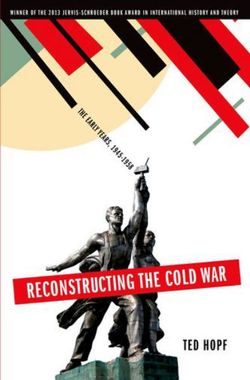and then lead to the loss of its most important strategic ally? What can explain Stalin's failure to ally with the leaders of the decolonizing world against imperialism and Khrushchev's enthusiastic
embrace of these leaders as anti-imperialist at a time of the first detente of the Cold War? It would seem that only idiosyncratic explanations could be offered for these seemingly incoherent policy outcomes. Or, at best, they could be explained by the personalities of Stalin and Khrushchev as leaders. The latter, although plausible, is incorrect. In fact, the most Stalinist of Soviet leaders, the secret police chief and sociopath, Lavrentii Beria, was the most
enthusiastic proponent of de-Stalinized foreign and domestic policies after Stalin's death in March 1953.Ted Hopf argues, instead, that it was Soviet identity that explains these anomalies.
During Stalin's rule, a discourse of danger prevailed in Soviet society, where any deviations from the idealized version of the New Soviet Man, were understood as threatening the very survival of the Soviet project itself. But the discourse of danger did not go unchallenged. Even under the rule of Stalin, Soviet society understood a socialist Soviet Union as a more secure, diverse, and socially democratic place. This discourse of difference, with its broader conception of what the socialist
project meant, and who could contribute to it, was empowered after Stalin's death, first by Beria, then by Malenkov, and then by Khrushchev, and rest of the post-Stalin Soviet leadership. This discourse
of difference allowed for the de-Stalinization of Eastern Europe, with the consequent revolts in Poland and Hungary, a rapprochement with Tito's Yugoslavia, and an initial warming of relations with China. But it also sowed the seeds of the split with China, as the latter moved in the very Stalinist direction at home just rejected by Moscow. And, contrary to conventional and scholarly wisdom, a moderation of authoritarianism at home, a product of the discourse of difference, did not lead to a
moderation of Soviet foreign policy abroad. Instead, it led to the opening of an entirely new, and bloody, front in the decolonizing world. In sum, this book argues for paying
attention to how societies understand themselves, even in the most repressive of regimes. Who knows, their ideas about national identity, might come to power sometime, as was the case in Iran in 1979, and throughout the Arab world today.




Share This Book: